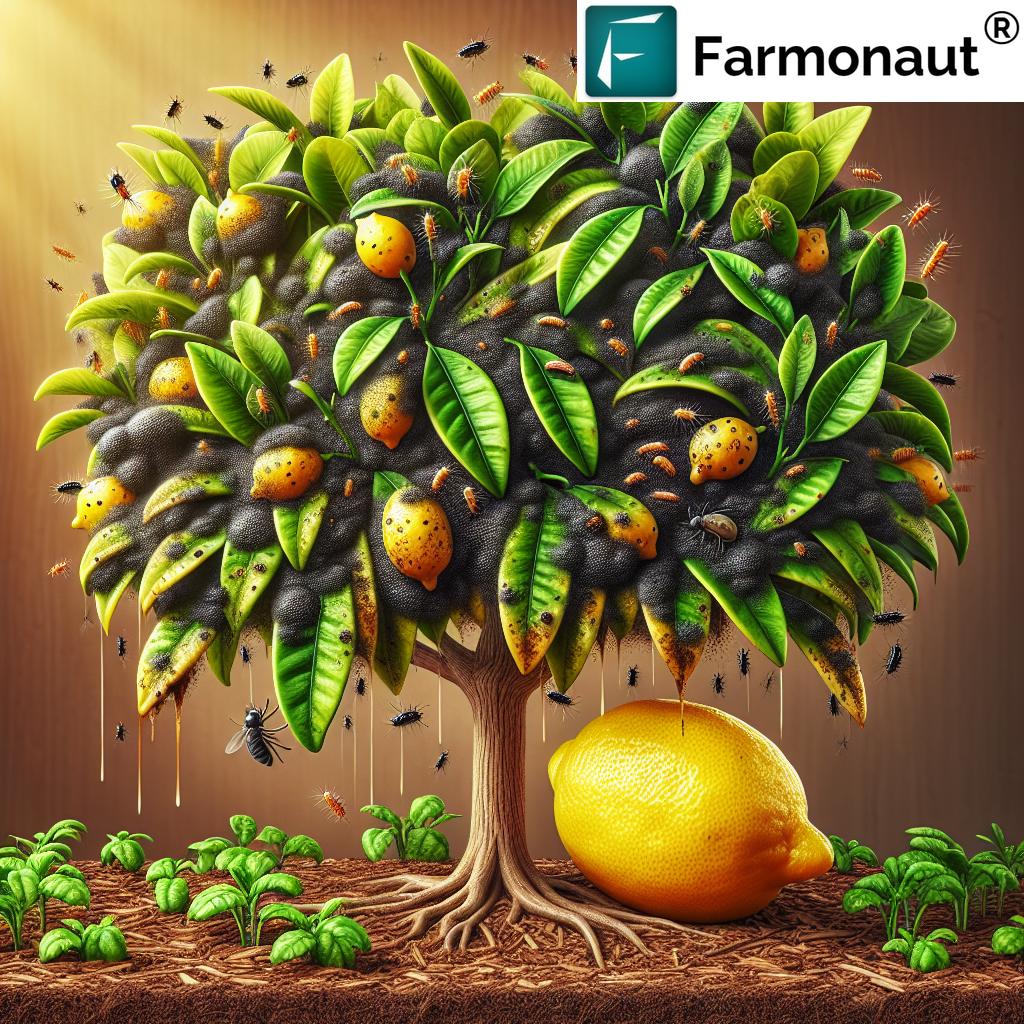Compost Tea & Worm Compost Tea: 7 Powerful Benefits for 2026
Compost tea and worm compost tea are among the top organic solutions boosting soil health, crop growth, and sustainable agriculture for 2026. Discover their benefits, preparation, and modern applications shaping eco-friendly farming and forestry!
“Compost tea can increase crop yields by up to 20% compared to untreated soil, promoting sustainable agriculture,”
- What is Compost Tea?
- Worm Compost Tea & Vermiculture
- Making Compost Tea: Modern Process & Ingredients
- 7 Powerful Benefits of Compost Tea & Worm Compost Tea for 2026
- Comparison of Benefits: Compost Tea vs Worm Compost Tea
- Applications in Agriculture, Forestry & Hydroponics
- Innovations and Best Practices for 2025–2026
- Farmonaut’s Role in Sustainable Agriculture
- Frequently Asked Questions: Compost Tea & Worm Compost Tea
- Conclusion
In 2025 and beyond, as the need for sustainable agriculture intensifies and the world transitions toward earth-friendly solutions, compost tea and worm compost tea have emerged as vital amendments. These organic, liquid extracts of microbial-rich compost or worm castings are redefining soil management and plant health. This article explores their concept, preparation, revolutionary benefits, and applications, while introducing innovative best practices for resilient farming, forestry, and horticulture in 2026 and beyond.
What Is Compost Tea? (Focus Keyword: Compost Tea)
Compost tea is a nutrient-rich liquid fertilizer brewed by steeping compost or worm castings in water. During this process, we extract and multiply beneficial microorganisms, boosting their populations and activity. Unlike applying raw compost, compost tea delivers active microbial life directly into the plant root zone, resulting in improved soil fertility, nutrient uptake, and robust disease resistance. With the shift away from harmful chemical inputs, this natural solution is rapidly gaining favor for its eco-friendly and sustainable results.
- Liquid extract: Compost or castings steeped and aerated in water.
- Delivers a rich dose of beneficial microbes and nutrients.
- Applied as soil drench or foliar spray for instant impact.
- Reduces need for synthetic fertilizers and chemical pesticides.
Worm Compost Tea: Leveraging Vermiculture for Potent Results
Worm compost tea is a specialized form of compost tea made using worm castings (also known as vermicompost). These castings are renowned for their rich microbial diversity, enzymes, and humic substances. By brewing worm compost tea, we can mobilize this biology into a powerful biofertilizer and biostimulant. This process is favored in organic and regenerative agriculture, where the enhancement of soil structure and biological activity is paramount for crop sustainability and resilience.
- Higher levels of beneficial microbes (1 billion+ per ml!)
- Enhanced humic substances to boost plant growth
- Rich enzymatic content naturally suppresses pests and diseases
- Strongly boosts root health, plant resilience, and nutrient availability
“Worm compost tea introduces over 1 billion beneficial microbes per milliliter, drastically improving soil vitality and resilience.”
Making Compost Tea: Process, Ingredients & Innovations for 2025–2026
The process of making compost tea is both art and science. It involves aerating water mixed with finished compost or worm castings for 12 to 48 hours. The goal is to multiply aerobic beneficial microbes while preventing harmful anaerobes. Major advancements in 2025–2026 ensure consistency, quality, and scalability for smallholders and large agribusinesses.
Step-by-Step Process for Making Compost Tea & Worm Compost Tea
-
Choose Your Compost/Base:
- Use finished compost or worm castings (vermicompost).
-
Prepare Your Vessel:
- Choose a food-safe container (minimum 20 liters).
- Install an air pump with diffuser to maintain dissolved oxygen levels.
-
Water Quality & Ratio:
- Dechlorinate water (let stand 24 hrs or use an anti-chlorine filter).
- Mix compost or castings at a ratio of 1:10 (example: 1 kg in 10 liters water).
-
Add Microbe Food Sources:
- Incorporate molasses, seaweed extract, or fish hydrolysate (~2 tbsp per 10 liters).
- These sustain and multiply microbial populations during the brewing process.
-
Brewing & Aeration:
- Aerate continuously for 12–48 hours.
- Monitor pH (6.5–7.5), temperature (20–25°C), and oxygen (6–8 mg/L).
-
Filtration:
- Strain through a fine sieve or compost tea bags.
- Minimize sediment for easy application as foliar or soil drench.
In 2025, compost tea bags (porous, reusable pouches) have simplified this process, allowing easy extraction and minimal mess, while their use in commercial systems supports consistency and hygiene.
Key Ingredients in Modern Compost Tea Brewing
- Compost or Worm Castings – The microbial and nutrient source
- Molasses – Provides sugars for microbial boost
- Seaweed Extract – Offers micronutrients and plant hormones
- Fish Hydrolysate – Stimulates fungal and bacterial diversity
- Clean Water – Acts as solvent and distribution medium
Innovations for 2025: Modern home and commercial brewers now incorporate smart monitoring (pH sensors, dissolved oxygen meters, temperature controls) for tailor-made blends suited to specific crops, climates, or system scale (open field, greenhouse, hydroponic, etc.).
Brewing Tips for Healthy Compost Tea & Worm Compost Tea
- Keep oxygen high – Prevents harmful anaerobe growth
- Wash equipment thoroughly – Avoid contamination
- Use the brew within 4 hours after straining, maximizing microbial activity
- Don’t brew longer than 48 hours: Nutrient depletion can lead to unwanted microbial shifts
7 Powerful Benefits of Compost Tea & Worm Compost Tea for 2026
1. Dramatic Boost in Soil Microbial Activity
Compost tea delivers active colonies of beneficial bacteria, archaea, and fungi directly to the soil. This microbial activity breaks down organic matter, releases nutrients, and improves soil structure, supporting healthy crops and rapid growth.
- Worm compost tea further boosts microbial diversity and introduces specialized enzymes for increased soil vitality.
- Enhanced soil health translates into resilient farming systems able to withstand stress, pests, or disease.
2. Disease Suppression & Plant Health
The vast populations of beneficial microbes in compost tea and worm compost tea outcompete plant pathogens, suppress harmful fungi and bacteria, and trigger plant immune responses. Foliar sprays act like a “probiotic shield” for plant surfaces.
- Reduces severity and incidence of common plant diseases
- Minimizes need for chemical fungicides or pesticides – safer and more sustainable
3. Enhanced Nutrient Uptake & Plant Growth
The active microbial life within compost tea breaks down nutrients into plant-available forms, accelerating growth. Worm compost tea’s extra enzymes and humic acids further stimulate root development, resulting in bigger, healthier plants.
- Promotes robust root systems and abundant foliage
- Boosts chlorophyll, yield, and overall productivity
Hydroponic growers in particular benefit from compost tea hydroponics, as increased beneficial microbes reduce nutrient lockout and system disease.
4. Improved Water Retention & Soil Structure
Microbial metabolites (polysaccharides, glomalin) produced during brewing encourage soil particles to stick together, increasing water-holding capacity and improving soil structure. This not only saves water but also reduces erosion, vital for regenerative agriculture.
5. Greater Nutrient Content for Plants
Compost tea supplies soluble macro and micronutrients directly to crops. Worm compost tea adds higher levels of trace elements and natural plant growth hormones (auxins, gibberellins), making it an excellent substitute for synthetic fertilizer.
6. Increased Crop Yield & Quality
Multiple studies confirm that regular applications of compost tea can improve crop yields by 10–25%, with worm compost tea yielding even more pronounced benefits due to its higher microbial and enzyme content.
- Produce is often sweeter, larger, and more nutrient dense
- Enhanced resistance to storage diseases and post-harvest decay
7. Positive Environmental and Economic Impact
Compost tea and worm compost tea offer a scalable path toward sustainability by:
- Reducing chemical fertilizer and pesticide use
- Utilizing on-farm waste and contributing to waste valorization
- Supporting regenerative systems that enhance soil organic matter and biodiversity
- Lowering input costs and reliance on external amendments
For farmers, forestry managers, and even commercial horticulturists, these teas form a modern cornerstone of eco-conscious productivity heading into 2026.
Comparison of Benefits: Compost Tea vs Worm Compost Tea
| Benefit | Compost Tea (Est. Improvement) | Worm Compost Tea (Est. Improvement) | Sustainable Impact |
|---|---|---|---|
| Soil Microbial Activity | +20% soil microbes | +25–30% soil microbes | Restores/boosts soil biology; lessens need for synthetic amendments |
| Disease Suppression | Reduces foliar/root diseases by 40% | Reduces foliar/root diseases by 50%+ | Minimizes chemical pesticide use, supporting pollinators/environment |
| Plant Growth Rate | +15% faster growth | +20–22% faster growth | Supports food security with quicker cycles |
| Water Retention | +12% water holding | +18% water holding | Reduces irrigation needs, conserves water resources |
| Nutrient Content | +10% more available nutrients | +15–18% more available nutrients | Boosts crop quality and nutritional value |
| Crop Yield | +15% yield increase | +20–25% yield increase | Decreases farm input costs, supports carbon sequestration |
| Environmental Impact | Reduces chemical fertilizer use | Maximally replaces chemical inputs | Promotes zero-input/low-carbon farming |
Applications of Compost Tea & Worm Compost Tea in Agriculture, Forestry & Hydroponics
Soil Drench for Active Root Zones
- Apply compost tea fertilizer at the base of plants (root drench) for maximal impact in vegetable crops, orchards, and plantation forestry.
- Boosts root colonization, nutrient access, and drought tolerance.
Foliar Spray for Disease Suppression
- Mist or spray compost tea or worm compost tea on leaves and stems, forming a protective microbial biofilm that outcompetes foliar pathogens.
- Especially effective for soft fruits, leafy greens, grapes, orchard crops, and nursery plants vulnerable to mildew, rust, or bacterial blight.
Compost Tea in Forestry
- Nurseries use compost tea fertilizer to establish strong seedling root systems (key for climate-adaptive afforestation).
- Field foresters apply it for tree stand establishment and restoring degraded woodlands.
Compost Tea Hydroponics: Addressing Root Health in Soilless Systems
As hydroponic and vertical farming systems expand in 2025–2026, compost tea hydroponics is now widely used to reduce disease pressure (such as Pythium root rot) and improve nutrient assimilation in these soil-less environments.
- Beneficial microbes stabilize the rhizosphere (root zone) and maintain healthy nutrient cycling.
- Commercial blends of compost tea for hydroponics are optimized for clean, residue-free foliar and root applications.
Application Tips for Hydroponics:
- Introduce low-dose compost or worm compost tea to the reservoir (0.5–1%) once a week.
- Monitor for possible sediment—use fine filtration or tea bags to avoid system clogs.
- Combines well with mineral nutrient solutions for hybrid organic-conventional systems.
Compost Tea Bags: Simplicity for Every Scale
- Compost tea bags make brewing accessible for gardeners, farmers, and commercial operations.
- Packed with finished compost or worm castings, they remove easily (minimizing sediment), and are reusable in many modern systems.
Commercial, Horticultural, and Large-Scale Use
- Automated compost tea brewing and delivery systems now support large-scale eco-farming, reforestation, and horticulture in 2026.
- Farmers deploying advanced agritech use real-time data on soil health, crop status, and nutrient levels to target compost tea applications precisely when and where needed for maximum return.
Innovations and Best Practices for 2025–2026
- Precision brewing tech: Automated management of brewing time, oxygen, pH, and nutrients for reproducible, commercial-scale results.
- AI-driven data analytics: Satellite-based technologies monitor soil health and recommend optimal application timing.
- Tailor-made microbial consortia: Custom blends suit different crops, climates, and stress environments.
- Hybrid organic–hydroponic systems using clean, filtered teas and biostimulant boosts.
- Blockchain-based traceability ensures product authenticity for compost and inputs, supporting transparency in commercial farm management.
Farmonaut’s Role in Advancing Sustainable Agriculture
We at Farmonaut are committed to propelling agriculture, farming, and forestry into a more sustainable future. With our advanced satellite-based technology and AI-driven advisory systems, businesses, individual farmers, and governmental agencies are empowered to:
- Monitor soil health, vegetation vitality (NDVI), and environmental impact in real time
- Receive tailored recommendations for organic amendments such as compost tea and worm compost tea to target specific crop or forestry zones
- Quantify the benefits of sustainable practices—like compost tea brewing or transitioning to organic systems—on carbon sequestration and input reduction
Download our platform for satellite-driven insights:
Integrate precise soil and crop monitoring into your own farm management system with the Farmonaut API.
Developers can review our comprehensive API developer documentation to build scalable, data-driven solutions.
For those seeking to expand or manage large areas sustainably,
Farmonaut’s Large Scale Farm Management tools help coordinate compost tea applications, monitor crop response, and optimize harvests using satellite-driven resource management.
For forestry, plantations and crop advisory, manage land use and environment proactively by accessing the Crop Plantation & Forest Advisory solution.
Secure financing and manage climate risks with satellite-based verification, ideal for farms using compost and organic solutions—learn more on our Crop Loan and Insurance page.
Frequently Asked Questions: Compost Tea & Worm Compost Tea
What exactly is the difference between compost tea and worm compost tea?
Compost tea is brewed from general compost containing plant, animal, and kitchen waste, while worm compost tea (vermicompost tea) uses worm castings as its base. Worm compost tea is typically higher in microbial diversity and contains more enzymes and humic substances, making it more effective as a biostimulant and biofertilizer.
How often should I apply compost tea or worm compost tea?
For most applications, apply every 2–4 weeks during the active growing season. For hydroponics or greenhouse crops, a weaker weekly dose may maintain beneficial microbial populations.
Can compost tea replace synthetic fertilizers entirely?
While compost tea significantly reduces dependence on chemical fertilizers and pesticides, total replacement depends on initial soil conditions, crop type, and farming goals. A combination of compost tea, organic mulches, and balanced crop rotations is ideal for maximum sustainability.
Is compost tea safe for all plants (including edibles)?
Yes, provided it is brewed aerobically and applied correctly. Use Finished and pathogen-free compost/castings, especially when using as a foliar spray on leafy greens or fruits. Always filter and apply promptly after brewing.
Does compost tea have benefits in hydroponics?
Yes! Compost tea for hydroponics or worm compost tea strengthens root health, suppresses pathogens in nutrient reservoirs, and accelerates plant growth, making it an important biological inoculant for modern soil-less systems.
Can I store compost tea?
No. Compost tea should be used within 4–6 hours of brewing to guarantee maximum microbial life. Refrigeration or storage leads to an explosion of unwanted anaerobes and loses most beneficial properties.
What is the most eco-friendly way to produce compost tea?
Use on-farm waste for compost, rainwater or recycled water for brewing, and return spent tea bags or sediments to the compost pile. This supports the zero-waste, circular economy approach in 2026.
How can Farmonaut help optimize my compost tea applications?
We help you monitor soil and crop health, identify optimal application timing, and validate the environmental and product traceability benefits of compost tea and worm compost tea using advanced satellite, AI, and blockchain solutions—scalable for any farm or forestry project size.
Conclusion: Compost Tea & Worm Compost Tea—Essential Tools for Sustainable Agriculture in 2026 & Beyond
Compost tea and worm compost tea represent more than just a sustainable alternative to chemical agriculture. They are cornerstones of modern organic and regenerative farming, offering robust solutions for improving soil health, maximizing yields, reducing environmental harm, and supporting global food security challenges anticipated in 2026 and beyond.
With science-driven brewing, widespread applications (from small gardens to large plantations and advanced hydroponic systems), and a focus on environmental stewardship, these amendments will play a central role in tomorrow’s thriving agricultural and forestry ecosystems.
Let us embrace compost tea and worm compost tea for their proven, powerful benefits—and propel our farms, forests, and landscapes towards a greener, more resilient future.
Ready to monitor, manage, and optimize your sustainable agriculture operations?
Start with Farmonaut’s cost-effective satellite, AI, and blockchain tools today!














